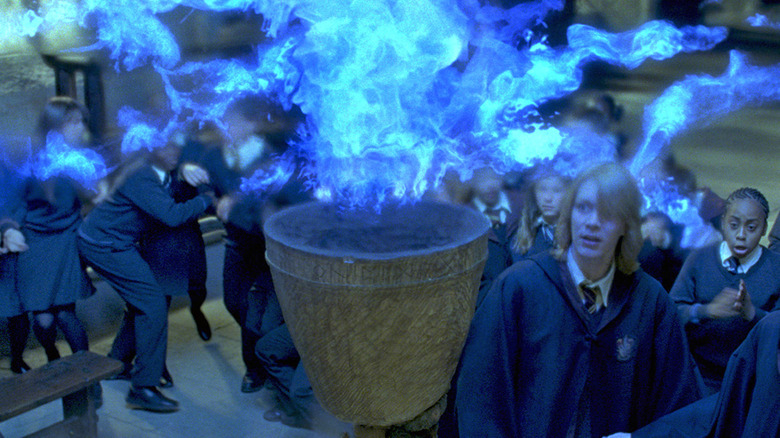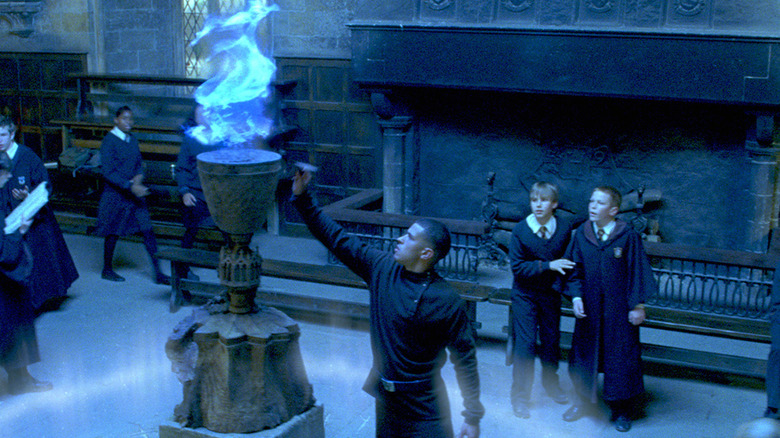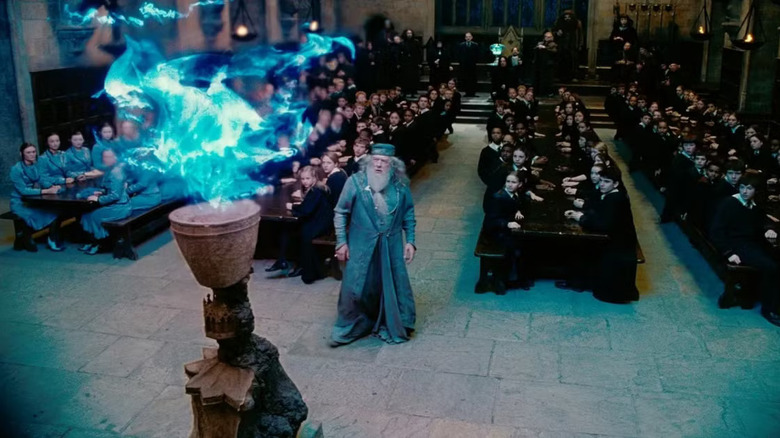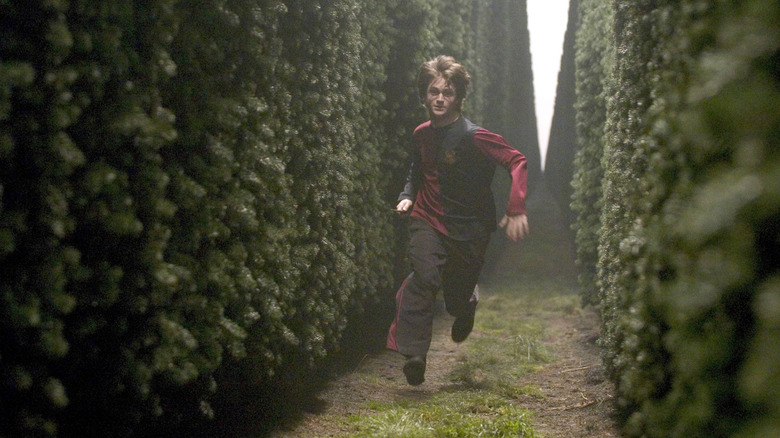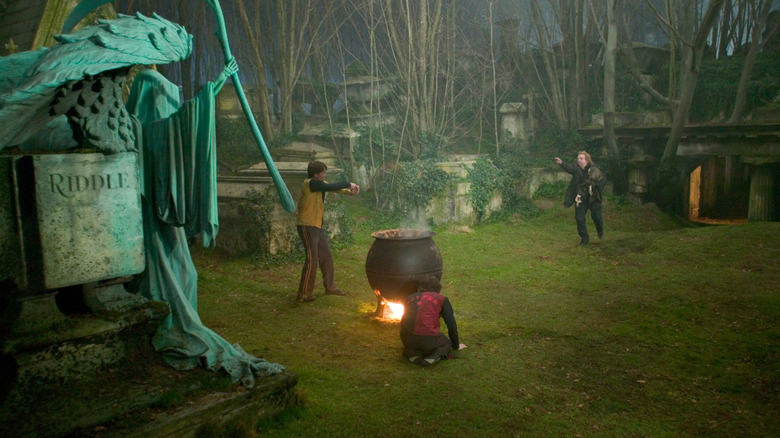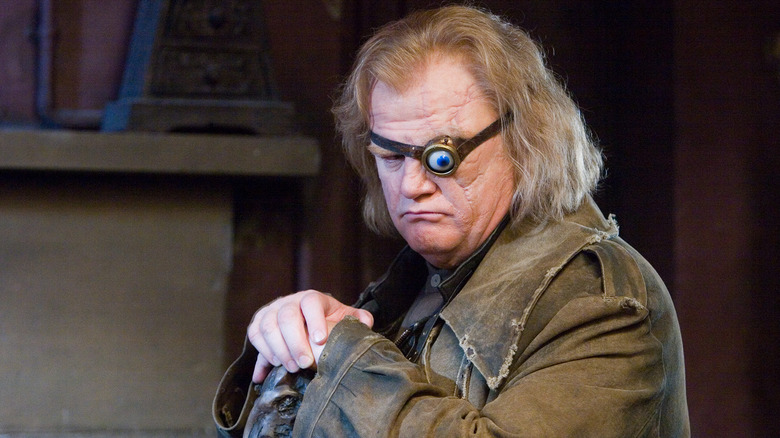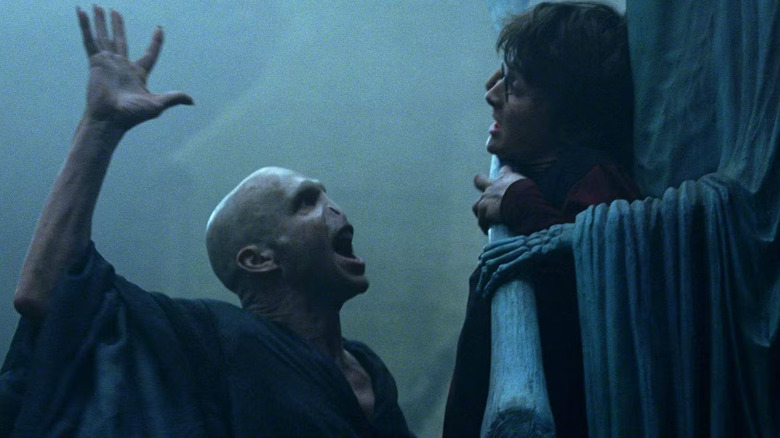Who Put Harry Potter's Name In The Goblet Of Fire (And Why)
It's an understatement to say that, during his time as a student at Hogwarts School of Witchcraft and Wizardry, Harry Potter — played on-screen by Daniel Radcliffe — gets into a ton of trouble. What's unfair about this is that, to Harry's credit, it's not usually his fault; as a baby, he managed to reverse a killing curse upon the Dark Lord Voldemort (eventually played by Ralph Fiennes in the film franchise) and created a deadly lifelong rivalry, which he certainly didn't intend to do. Throughout his first few years at Hogwarts, Voldemort, who hasn't yet returned to his corporeal form, employs a few tricks — from a haunted diary to an old henchman to a possessed professor — to try and attack Harry, but there's not much he can do without a body. This is all to say that in the fourth book and film, "Harry Potter and the Goblet of Fire," Voldemort fully returns ... after staging a highly elaborate plan centered around a multi-school competition known as the Triwizard Tournament.
So, what about this titular goblet? Why is it so important? How does it work, and how does it affect Harry? Here's everything you need to know about why and how Harry's name ends up in the eponymous Goblet of Fire (and everything that happens after the goblet officially makes him a Triwizard Champion).
What is the Goblet of Fire and why is it so important?
Let's start here: what is the Triwizard Tournament? Before the events of "Goblet of Fire," the tournament hasn't been held in years — in the book, Hermione Granger (played in the movies by Emma Watson) tells Harry and their other best friend Ron Weasley (Rupert Grint in the films) that the most "recent" tournament took place in 1792 before a cockatrice injured the champions. (Quick but important context: the "Harry Potter" books canonically take place throughout the 1990s, which means that the Triwizard Tournament takes a break for the entire 19th century before returning in 1994). When news breaks that it's being hosted by Hogwarts in 1994 and that two other wizarding schools — Beauxbatons from France and Durmstrang in Scandinavia — students are excited, until Albus Dumbledore, played by Michael Gambon on-screen, reveals that you can only submit your name to become a Triwizard Champion for your school if you're 17 or older.
The Goblet of Fire is the receptacle where eligible students (meaning, again, they're at least 17 years old) enter their names, which all culminates in a ceremony where the Goblet spits out three names — one for each school. That's the plan, anyway. So, what exactly goes wrong?
What happens when Harry Potter's name emerges from the Goblet of Fire?
During the aforementioned ceremony, three names emerge as planned: Cedric Diggory for Hogwarts, Viktor Krum for Durmstrang, and Fleur Delacour for Beauxbatons (played in the movies by Robert Pattinson, Stanislav Ianevski, and Clémence Poésy, respectively). At that point, it seems like everything is set until the Goblet unexpectedly releases a fourth name ... and naturally, it's Harry's, even though he didn't enter it in the first place. In fact, based on Dumbledore's magical Age Line that surrounded the Goblet itself, Harry couldn't have entered his name, as everyone clarifies when Harry, Dumbledore, the headmasters of Beauxbatons and Durmstrang, and a handful of teachers excuse themselves from the ceremony to discuss the situation.
Here's the problem: as Barty Crouch Sr. (played in the movies by Roger Lloyd-Pack) points out, Harry's name being presented by the Goblet means that he's magically required to compete in the Triwizard Tournament, so there's no turning back — and Hogwarts officially has two champions. (Dumbledore also personally confronts Harry about how his name got into the Goblet, and this moment differs drastically between the book and film; in the book, he "asks calmly," and in the movie, Gambon makes the baffling choice to go ballistic. Go figure.) This is not what Harry wanted, despite the fact that the Triwizard Tournament offers a grand prize worth quite a lot of money as well as fame and acclaim — he's only 14, terrified about competing, and baffled by the fact that he's even allowed to do so. He's right to be frightened; the Triwizard Tournament is, to paraphrase another fantasy series, dark and full of terrors.
The Triwizard Tournament is full of dangerous tasks for Harry Potter to complete
Right away, Harry is told to prepare for the first task in the Triwizard Tournament, except one important detail is withheld: nobody knows what the four champions will be facing. Luckily for Harry's prospects, cheating is rampant in the tournament, and thanks largely to groundskeeper and Care of Magical Creatures professor Rubeus Hagrid (played by the late Robbie Coltrane), Harry, along with the other champions, finds out that they'll each be facing a different dragon and tasked with stealing a golden egg from the dragon's nest. Obviously, this is extremely high-risk, but Harry ends up earning a decent score by practicing the Summoning Charm and ordering his broomstick directly to the playing field, using his Quidditch skills to dodge the beast and steal the egg.
The egg itself provides a clue to the second task, but nobody can figure out how at first considering that when you open the egg to listen to its song, it just sounds like a bunch of screeching. After Harry clued Cedric in about the dragons, Cedric kindly returns the favor and tells Harry to bring the egg into the bath, at which point he discovers that it contains a musical message from the merpeople who reside at the bottom of Hogwarts' Great Lake, revealing they'll steal something Harry can't live without. This "something" turns out to be Ron, Harry's best friend — Hermione is taken as a "hostage" as well on behalf of her new paramour Viktor Krum — and Harry uses gillyweed to transform himself into a sort of fish-person to rescue the people underwater. (Apparently, Daniel Radcliffe really liked shooting those scenes.)
The third task is ostensibly pretty straightforward: it's a maze filled with magical obstacles, and the Triwizard Cup is smack in the center. Faced with sphinxes, giant spiders known as Acromantulas, and enchantments and spells that disorient the champions, Harry and Cedric make it to the Cup and decide to take it together for Hogwarts. Sadly, this turns out to be a deeply tragic mistake.
At the end of the tournament, Harry Potter and his fellow champion are put in sudden danger
When Harry and Cedric grab the Portkey's handles together, something wholly unexpected happens: they're transported elsewhere, revealing the Cup has been turned into a Portkey (a magical object witches and wizards use for fast-travel purposes). When they crash-land in a mysterious graveyard, both boys are baffled until Peter Pettigrew, played in the films by Timothy Spall, emerges and does something horrible. On the orders of a still-unseen Voldemort ("Kill the spare!"), Pettigrew, one of the Dark Lord's most loyal lieutenants, casts the Killing Curse at Cedric and murders him on the spot.
Horrified and stunned by what he's just witnessed, Harry is easily captured by Pettigrew, who takes some of his blood and combines it into a dark, twisted potion with Pettigrew's own hand and a bone taken from the grave of Voldemort's father. ("Bone of the father, unknowingly given, you will renew your son!" the incantation goes. "Flesh of the servant, willingly sacrificed, you will revive your master. Blood of the enemy, forcibly taken, you will resurrect your foe.") Voldemort officially rises again and summons his long-dormant Death Eaters to watch as he takes down Harry once and for all. Seemingly beaten, Harry decides to go down fighting until something else unexpected happens, which is that his wand and Voldemort's wand — which share twin cores, having taken phoenix feathers from the same bird — connect, at which point Harry sees the ghosts of people killed by Voldemort. In the ensuing confusion, Harry is able to grab both Cedric and the Cup and return his fallen friend to Hogwarts, and the tournament's audience watches in horror as the dead body of a teenage boy appears on the grounds of Hogwarts.
The person who put Harry Potter's name into the Goblet isn't who you think
Okay, so who was behind this, now that we know Voldemort didn't even have a physical form until Harry and Cedric arrived in the graveyard? In the book, a seemingly familiar figure — Alastor "Mad-Eye" Moody, an Auror and Hogwarts professor played in the movies by Brendan Gleeson — escorts him away from Cedric's body, asking him questions along the way. When Harry and Mad-Eye reach the latter's office, Harry has a horrible realization: the person standing in front of him is not Mad-Eye Moody, but one of Voldemort's most loyal Death Eaters, Barty Crouch Jr. (played by David Tennant on-screen). Though everyone believes that Crouch Jr. died in prison, he actually switched places with his dying mother at her request; after breaking free of the enchantments set by his father Barty Crouch Sr. and reuniting with Voldemort, the younger Crouch used the unconscious body of the real Mad-Eye and a stock of Polyjuice Potion to impersonate the teacher.
Despite the fact that Crouch Jr. could provide crucial information to the Ministry of Magic about Voldemort and his return, officials stand by and allow dementors — the guards of the wizard prison Azkaban, from which the convict escaped — to "kiss" him, removing his soul and effectively killing him. What this leads to is the Minister of Magic, Cornelius Fudge (Robert Hardy in the movies), calling Harry a liar to hide Voldemort's return from the general public, which casts Harry as a social outcast to prevent mass panic.
This trick with the Goblet of Fire leads to two of the franchise's most shocking events
So, why does the initial fact that Barty Crouch Jr., masquerading as Mad-Eye Moody, tampered with the Goblet of Fire matter when all is said and done? Perhaps most importantly, the trick facilitates the return of Voldemort, one of the most evil and skilled wizards to ever live — who, without this gambit, would still be without a body and much power at all. Throughout the following installment, "Harry Potter and the Order of the Phoenix," Voldemort simply grows and grows in power as the Ministry keeps insisting that nobody should ask any questions or believe anything Harry says; the time they allow for Voldemort to rebuild his army and resources is absolutely crucial and leads to a number of devastating deaths in the war ahead.
Speaking of devastating deaths, let's talk about Cedric Diggory for a moment. By the end of the "Harry Potter" books and films, a lot of major characters are dead, but Cedric is the first character to die in a truly senseless way; he quite literally only dies because he and Harry make the decision to share the Triwizard win for Hogwarts and ends up being collateral damage in Voldemort's quest to capture and kill Harry. Cedric's death in "Goblet of Fire" is a major turning point for both the book and film franchises in that it is, in my opinion, the moment where the property gets serious. This is a scary and devastating situation, and the pointless, cruel murder of a teenager is a major event that informs the darkness of the rest of the story — and it's all because one guy messed with a magical goblet.
The "Harry Potter" movies are streaming on Peacock now.
